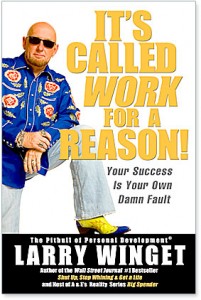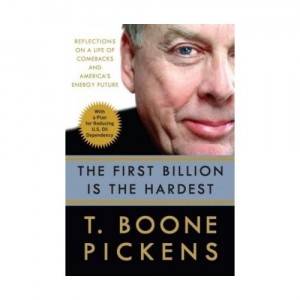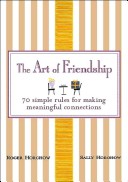Very brutal and honest! He’s the “irritational” (vs. inspirational) speaker. Boy, how honesty hurts!
People aren’t working!
On how to work:
– Work faster, smarter, and harder. Stay busy. Find things to do.
– Stop periodically during the day and ask yourself: Does this matter? Is it contributing to the overall well-being of the company? Am I really getting something done or just killing time?
– Never tolerate poor performance in yourself or others.
– Create a clean, organized environment that encourages work.
– Expect the best from everyone.
– Teach your employees how to be good workers.
– Manage priorities, not time.
– Figure out what absolutely has to get done, and then do it first.
– There is plenty of time to do the right thing.
For keeping it simple:
– If it starts feeling complicated, stop and reevaluate. There is a simpler way – find it.
– Stop listening to those who want to complicate things.
– Take action quickly on the simple ideas.
– Get better, and the things around you will get better.
– The things it takes to be successful in life are the same things it takes to be successful in business.
On getting results:
– Focus on the results. Results are everything and they never lie.
– Explain the big picture to all employees so they know why they are doing their jobs.
– Whatever you have or are experiencing is what makes up your results.
– Put more service into every hour, not more hours into the service.
– The number-one reason why results aren’t what they should be: apathy.
– Well-paid employees are typically loyal employees.
– You are not paid for efforts; you are paid for results.
For loving your job:
– Love and enjoy what you do enough to be amazing at it.
– It takes more than passion, enthusiasm, love, and enjoyment to be great at your job; you must be good at what you do.
– You aren’t paid to do your job; you are paid to do your job.
– Some days you must put up with 90% of your job to get to the 10% you really enjoy.
– Spice up your job a little to rekindle the passion you once had for it.
I like the Larry’s simple keys to success:
– Take personal responsibility
– Things change, so be flexible
– Work smart and work hard
– sever others well
– Be nice to others
– Be optimistic
– Have goals, want something big for yourself
– Stay focused
– Keep learning
– Become excellent at what you do
– Trust your gut
– When in doubt, take action
– Earn all you can. Save all you can. Give all you can.
– Enjoy all you’ve got
– Keep it simple!
Business gets better right after the people in the business get better!
Ask yourself what you have done today.
You don’t have to love your job in order to be excellent at it (but it helps.) “Just because you are following your bliss, it doesn’t mean anybody’s going to pay you for it. They pay you because you are good at what you do and because you serve them well.” “Excellent does not come just from enjoyment or passion or love or fun. Excellence comes from study, experience, from screwing up and doing it wrong until you finally get it right – the good old-fashioned hard work. Spice up your job a little to rekindle the passion you once had for it.
Become invaluable:
– Know everything you can about your company and its product line, and about how business is conducted.
– Stay out of personal conflicts with coworkers and customers and rise above pettiness.
– Put the customer first when making decisions
– Understand your competition
– Pursue excellence in every area of your factivities
– Work fast. When you work fast, you have a tendency to do the right things. “When you expect the work to be done quickly and when you reward work that is done quickly the work will get done quickly.”
On respect:
– Build respect in your organization from the ground up
– Respect your coworkers, especially in front of customers
– Respect your customers, especially in front of other customers
– Respect your competitors, especially in front of customers
– Respect the physical space your business occupies.
– Remember that little stuff makes a big difference in how customers perceive your business
Dealing with idiots:
– We’re all dealing with stupid people
– Never reduce yourself to their level. Rise above them.
– Mind your own business.
– Confront and communicate.
– Be fair, because everyone has a bad day. Determine whether it’s a bad day or consistently bad, inappropriate behavior.
– Don’t be a tattletale.
– You coworkers are not one big happy family; you don’t have to like them. You are required to tolerate them, and anything more is a bonus.
On Ethics:
– Ethics is not a sometime thing.
– Anyone who will lie about the little things will lie about the big thing.
– Any time you give less than your best effort, you are stealing.
– Listen to your gut; it knows right from wrong even when the rest of you can’t figure it out.
– If you have to ask if it’s wrong, it is.
On Competing:
– Do not believe in the competition
– You cannot build yourself up by tearing others down
– Customers won’t spent their money on different, but pay a premium for unique.
– “Branding” is just discovering you uniqueness and learning how to exploit it.
– You uniqueness is always based on your authenticity.
– Give people a chance. Not many chances, but at least a few
How to handle employees as a leader:
The top 20%: get out of their way. They will leave eventually.
The mid 60%: Get them to become the next top 20% or bottom 20%.
Bottom 20%: get rid of them.
The interesting part is that the mid 60% can be managed to become top 20% or bottom 20%. I’m not sure I have seen this kind of phenomenon but it makes sense.
Winget does not believe in motivating employees. “It doesn’t work. People do what they want to do when they want to do it and when the consequences of not doing it are painful enough to force them to do it.”
On team work:
– Teamwork doesn’t work because someone on the team won’t work.
– Instead of teams we should create groups of superstars, exploiting their individuality.
– Superstars don’t like to share the spotlight. Don’t ask them to.
– Superstars love working with other superstars to achieve a common goal.
– The same rules don’t apply to everyone. Great results earn you slack.
– Beware of the self-professed team player.
On serving others well:
– We are rewarded in life for only one thing: sever others well.
– If you receive a complaint, admit your responsibility, apologize, and fix the problem.
– Policies and procedures should at least pass the commonsense test.
– The better we serve others, the better we are in turn served.
On selling:
– Selling should be based on principles, not techniques.
– The five reasons people won’t buy: no need, no hurry, no money, no want, or no trust.
– To sell more: Look successful, be friendly, ask, be observant, listen, circulate, keep learning.
– To sell even more: Be honest, return calls, take notes, be on time, become great on the phone, underpromise and overdeliver, follow up, have a great handshake, bounce back.
– People buy for one main reason; find out what it is. Ask.
The surprising things for me are:
Motivation doesn’t work
Teamwork doesn’t work
To-do list and most time management techniques kill productivity and don’t work (what you get done is more important than what you do)
You don’t have to love your work or passionate about your work to do well.
We’re all turning into spectators than doing the work ourselves.
Most people works only 50%. Poor productivity. You’re stealing if you don’t give 100% of yourself.
Your results are your own faults. If your life sucks, it’s because you suck. If you don’t like the things they way they are, go to a mirror.
This is a great book. It’s like facing your creator on the judgment day. I have learned quite a few things to be a better employee and better leader.





